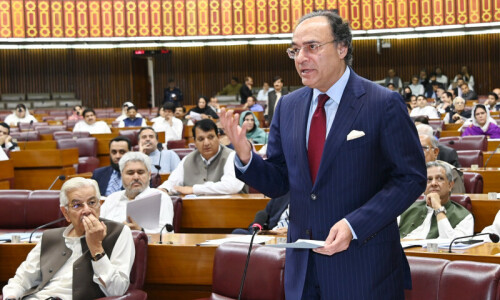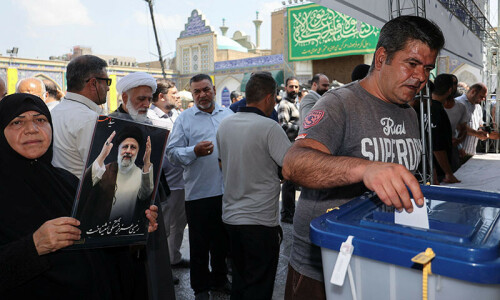VIENNA: The board of governors at the UN’s nuclear watchdog passed a resolution critical of Iran on Friday, the first of its kind since 2012, as tension mounts over Tehran’s nuclear programme.
The resolution was put forward by European states and urges Tehran to provide inspectors from the International Atomic Energy Agency (IAEA) with access to two sites in Iran to clarify whether undeclared nuclear activity took place there in the early 2000s.
It “calls on Iran to fully cooperate with the Agency and satisfy the Agency’s requests without any further delay, including by providing prompt access to the locations specified by the Agency”.
Iran has been blocking access to the sites for months, prompting a growing diplomatic row.
The resolution was carried by 25 votes in favour versus two against, with seven abstentions: South Africa, India, Pakistan, Thailand, Mongolia, Azerbaijan and Niger.
Iranian envoy says move won’t encourage Tehran to grant IAEA access to two sites
Russia and China, both of which had spoken out against the prospect of a resolution earlier this week, voted against.
The resolution was proposed by France, Germany and Britain, and supported by the United States -- though the American ambassador to the UN in Vienna had said “the text could be strengthened”.
Iran’s Ambassador to the UN in Vienna Kazem Gharib Abadi told Friday’s meeting that the resolution will not “encourage Iran to grant access to the Agency based on fabricated and unfounded allegations”.
“Iran categorically deplores this resolution and will take appropriate action in response, the repercussions of which would be upon the sponsors of this resolution,” he added.
“While stressing the need for Tehran and IAEA to settle this problem without delay, we believe that the resolution can be counterproductive,” Russia’s Ambassador to the UN in Vienna Mikhail Ulyanov tweeted after the resolution was passed.
Even though the sites in question are not thought to be directly relevant to Iran’s current nuclear programme, the agency says it needs to know if activities going back almost two decades have been properly declared and all materials accounted for.
‘No exceptions’
Despite the row over the two sites, the IAEA says it still has the access it needs to inspect Iran’s declared nuclear facilities, as per its mandate under the landmark deal between Iran and world powers reached in 2015.
However the latest dispute comes as that deal further unravels, with Iran continuing to breach its limits on nuclear activity in retaliation to a US withdrawal from the accord in 2018 and renewed sanctions.
Iran has previously hinted that a resolution along the lines of the one passed on Friday could cause “complication and difficulties” for the future of the 2015 accord, also known as the Joint Comprehensive Plan of Action (JCPOA).
In his statement, Gharib Abadi warned the IAEA against actions that could lead to “the destruction of the JCPOA”.
Speaking to reporters after the resolution was passed, IAEA Director General Rafael Grossi said it would be “absolutely unacceptable” if an example were to be set that states can be selective in their implementation of agreements with the UN agency.
“There are no exceptions. There is no Additional Protocol a la carte,” Grossi said, referring to the agreement under which the IAEA requested access to the sites.
“I intend to sit down with Iran very soon and to try to solve this as soon as possible,” he said, adding that Gharib Abadi would be his first port of call.
Earlier this week Iran said the IAEA’s access requests were based on allegations from Iran’s arch-enemy Israel.
Additional information provided by the IAEA to back up its requests “were merely some commercial satellite imageries that contained no convincing underlying reason” to provide access, Tehran argues.
Also on Friday the British Foreign Office said Foreign Secretary Dominic Raab would be meeting French and German counterparts in Berlin to discuss “a diplomatic solution to Iran’s destabilising activities in the Middle East”.
Published in Dawn, June 20th, 2020











































